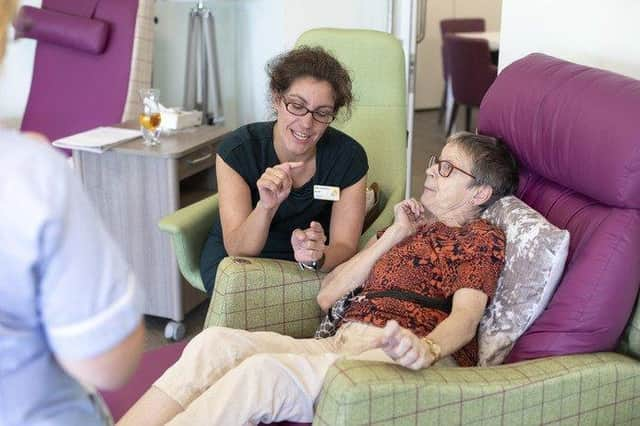‘I often have a cry on the way home’: What it’s like working in a hospice during this pandemic


As the medical director of the Marie Curie Hospice, Bradford, I oversee all medical care that the hospice provides. Coronavirus is unlike anything I’ve ever experienced in medicine.
Normally, however busy you are at work, you go home and the world is still carrying on as normal. But driving home now feels like you are in some sort of science fiction film.
Advertisement
Hide AdAdvertisement
Hide AdI have asthma, but my patients need me more than the risk coronavirus poses to my health. I don’t feel particularly worried for myself, but my family worries about me. My 10 -year-old daughter told me that she is scared I am going to die, but I have promised her I will be safe.
That fear is present in all the staff too – they’re worried about taking the infection home to their families. Even those of us that don’t wear a uniform now wear scrubs in the hospice. As soon as I get home, the scrubs go straight in the washing machine and I have a shower.
We changed our visiting policy after the Government’s announcement on social distancing and asked patients to identify key visitors. Some people identified one person, some half a dozen. Then as the restrictions got tighter, we had to update our guidance to only allow one visitor for anyone at the end of life.
We’re trying to adapt and be flexible. When patients have their own smartphones, they’re using them, but when they don’t, the hospice are providing special iPads so people can have virtual visiting in some way.
Advertisement
Hide AdAdvertisement
Hide AdMost patients have accepted it. I think they’re more worried about their own families and don’t want their loved ones at risk. One lady has a particularly close relationship with her daughter, and they found being separated very difficult, so the daughter has isolated and stayed in her room in the hospice rather than visiting.
I am now also conducting all of my medical consultations via videocalls. In palliative care we end up holding people’s hands or hugging or touching, and there just isn’t that closeness when you’re doing a video call. Last week a patient’s wife said she wished she could give me a hug, so we had this virtual hug where we reached out our arms on camera. It was strange, but at least we could see each other.
It’s worrying that people hold off coming in when they really need to, because they are frightened of being admitted in case they catch coronavirus, so they struggle on at home putting up with symptoms that we might be able to fix quickly.
One of my patients, who has end stage liver disease, was struggling with pain and vomiting at home. His GP suggested he go to hospital for some intravenous fluids, but he didn’t want to go as he was terrified that he would catch coronavirus. We had an empty bed in the hospice, so I suggested he come in to get his symptoms under control. He eventually came in, but it took a few days to get his head around the idea.
Advertisement
Hide AdAdvertisement
Hide AdDriving home is the hardest time of the day. I can stay strong when I’ve got work to distract me and I know I am in control and can stay calm. But when I get in the car at the end of the day, and take a deep breath, and drive home through the empty streets, everything we’re facing just hits me, and I quite often have a little cry on the way home.
I think I spend a lot of the day absorbing the fears of others and trying to reassure everyone, and then at the end of the day all my own emotions start to leak out. Every week Clap for Carers makes me cry.
This pandemic will teach us a lot. I hope it will make people think more about the funding of palliative care. I don’t think the public realise how much of end of life care is charitably funded, rather than by the NHS. And it does worry me how we’ll continue to provide that in the future, when our fundraising income is dropping, but I know we are going to be needed now more than ever.
Editor’s note: first and foremost - and rarely have I written down these words with more sincerity - I hope this finds you well.
Advertisement
Hide AdAdvertisement
Hide AdAlmost certainly you are here because you value the quality and the integrity of the journalism produced by The Yorkshire Post’s journalists - almost all of which live alongside you in Yorkshire, spending the wages they earn with Yorkshire businesses - who last year took this title to the industry watchdog’s Most Trusted Newspaper in Britain accolade.
And that is why I must make an urgent request of you: as advertising revenue declines, your support becomes evermore crucial to the maintenance of the journalistic standards expected of The Yorkshire Post. If you can, safely, please buy a paper or take up a subscription. We want to continue to make you proud of Yorkshire’s National Newspaper but we are going to need your help.
Postal subscription copies can be ordered by calling 0330 4030066 or by emailing [email protected]. Vouchers, to be exchanged at retail sales outlets - our newsagents need you, too - can be subscribed to by contacting subscriptions on 0330 1235950 or by visiting www.localsubsplus.co.uk where you should select The Yorkshire Post from the list of titles available.
If you want to help right now, download our tablet app from the App / Play Stores. Every contribution you make helps to provide this county with the best regional journalism in the country.
Sincerely. Thank you.
James Mitchinson
Editor